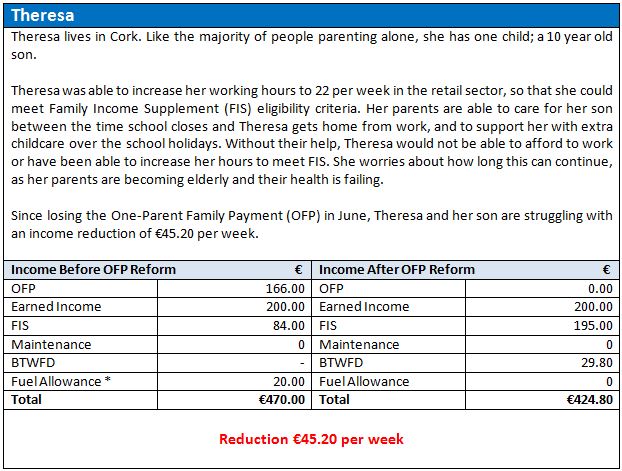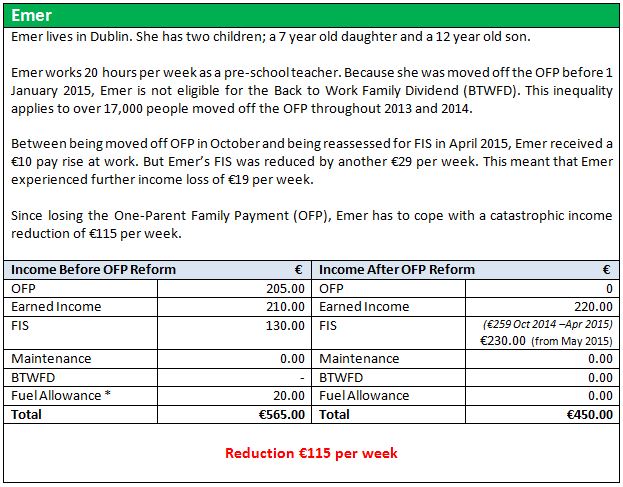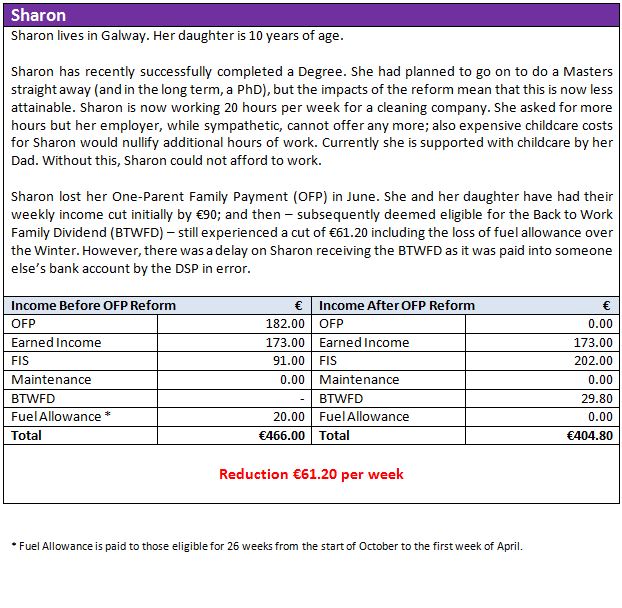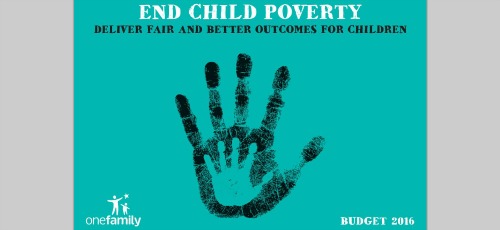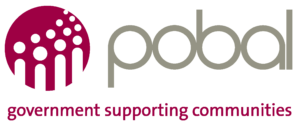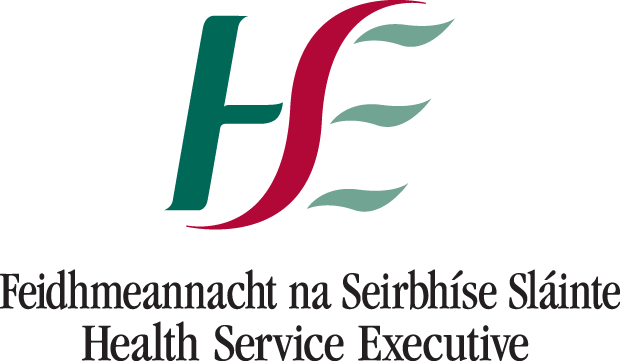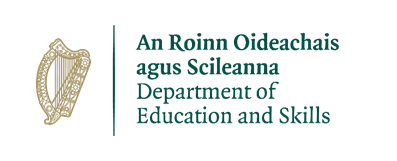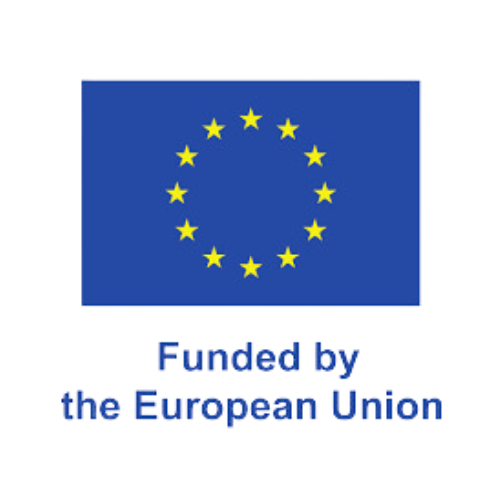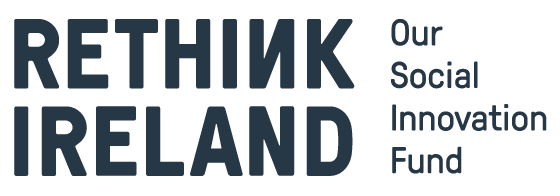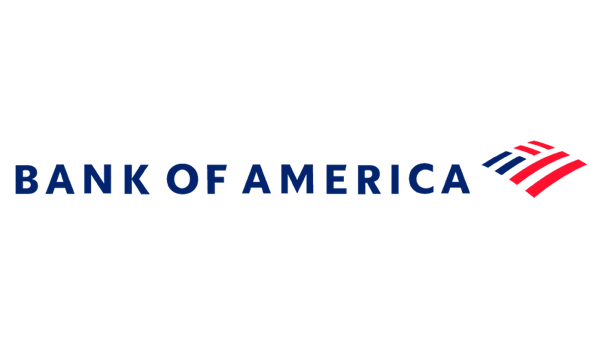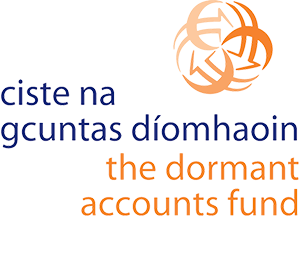Press Release
End Child Poverty,
Get it Right for One-Parent Families
in Budget 2016
One Family will state at the Pre-Budget Forum tomorrow that Government has sacrificed lone parents and their children for long enough.
(Dublin, Thursday 2 July 2015) One Family, Ireland’s organisation for people parenting alone, sharing parenting and separating, will be participating in the Department of Social Protection’s Pre-Budget Forum tomorrow where CEO Karen Kiernan will call for an immediate review of Government’s current One Parent Family Payment (OFP) reform process. These reforms, on top of a sustained series of cuts targeting one-parent families – such as the reduction in Income Disregard and discontinuation of the One Parent Family Tax Credit – were implemented without supports including childcare in place, resulting in even greater poverty for thousands of Ireland’s most vulnerable families. Over 30,000 families have been moved off the OFP today.
Karen Kiernan, One Family CEO, states: “Government policy, despite the stated intent to support one-parent families out of poverty, is proving to be a monumental failure. Children in one-parent families are more than twice as likely to live in poverty. The number of children in Ireland living in consistent poverty – meaning they are living both at risk of poverty and experiencing deprivation – has risen to nearly 12%. When you analyse these figures, it reveals that 23% of children in a one-parent family experience deprivation. They have carried the burden of austerity on their shoulders as the poorest and most vulnerable in our society. What we are calling for in Budget 2016 is something that is long overdue. Put simply, it is time for a fair deal for one-parent families.”
Lone parents want to work and to access education so that they can create positive outcomes for their children, yet Government consistently implies that they need to be compelled to do so. This conveniently ignores the reality that barriers such as lack of accessible, affordable childcare/out of school care have yet to be removed. Lone parents already working part-time are those who are being most affected by the current process of reform as they are experiencing income decreases of up to €100 per week on already minutely managed budgets. Rather than giving away tax breaks or giving a miserly €5 per week in Child Benefit, Budget 2016 should be radical in its approach to investing in services for our poorest children and families.
Karen continues: “We are expressing loudly and clearly that Government must invest in Budget 2016 in a coherent package of supports and services for parents moved off the One-Parent Family Payment and to Job Seeker’s Allowances if it is serious about supporting lone parents into sustainable employment and out of social welfare. Quality, affordable childcare and out of school care; access to quality and assured housing; and family-friendly employment opportunities require significant government investment and cross-departmental collaborations. Without this, the Department of Social Protection’s reform process will continue to fail and families will continue to suffer.”
Budget 2016 must demonstrate a firm commitment from Government in working towards resourcing one-parent families rather than penalising them, and to work towards ending the shameful spectre of child poverty in Ireland.
One Family’s Pre-Budget Submission 2016 can be read/downloaded here. The Pre-Budget Forum takes place in the Printworks, Dublin Castle on Friday 3 July from 9am-2pm.
/Ends.
NOTES FOR EDITORS
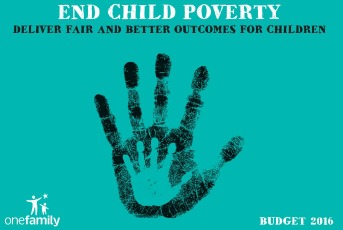 Budget 2016 Submission
Budget 2016 Submission
One Family’s recommendations for Budget 2016 are simple, low cost and cost effective; and provide a social and economic future which is based on investment and opportunity.
A package of supports for OFP recipients being transitioned must include:
- The Income Disregard to remain at €90 for all OPFs regardless of their payment.
- Equal access to all activation measures and in particular MOMENTUM.
- Access to free fees for part-time education options.
- Allow JSTA CE participants to have an additional payment of €50/week equalising it with JobBridge in recognition of family costs.
- Provide specialist bridging programmes for lone parents such as New Futures and New Steps.
- Raise the Qualified Child Increase to help reduce child poverty by tailoring it to the poorest families.
- Recognise the value and costs of shared parenting by providing the Single
Person Child Carer Credit to each parent.
- Adjust the Family Income Supplement so that it makes work pay for lone parents by reducing the qualifying hours to 15 hours per week and taper payment.
- Provide a high quality accessible Childcare and Out Of School Care system.
Previous Budget Cuts
Previous cuts that have targeted One-Parent Family Payment recipients since Budget 2011 include:
- The One Parent Family Tax Credit was discontinued and replaced with the Single Person Child Carer Credit, which only one parent can claim, whereas the previous credit could be claimed by both parents sharing parenting.
- Maternity Benefit was standardised at €230, an increase for some but a decrease of €32 for others.
- The FÁS training allowance was discontinued for those in receipt of some social welfare payments, including those receiving One Parent Family Payment.
- Child Benefit was reduced from €140 per child to €130 (for 1st, 2nd and 3rd child) in Budget 2013.
- Back to School Clothing & Footwear Allowance (BTSCFA): Reduced from €250 to €200 for children aged 12+, and from €150 down to €100 for 4-11 year olds.
- Cost of Education Allowance (paid with Back to Education Allowance, BTEA) cut completely from €300 down to €0 for all new and existing BTEA recipients.
- BTSCFA, from €305 reduced to €250 for 12+, and from €200 down to €150 for 4-11 yr olds; age eligibility also increased from 2 to 4 year olds in 2012.
- Ongoing cuts to OFP include Income Disregard cut from €146.50 down to €90.
- The half rate transition payment of OFP was cut for those who were going into work and stopping payment.
- OFP recipients lost access to half rate payment for Illness Benefit and Jobseeker’s Benefit, where applicable.
- Fuel Allowance was reduced from 32 weeks to 26 weeks.
- Cost of Education Allowance (for BTEA recipients) reduced from €500 to €300.
- CE Scheme participants, many of whom were lone parents, had their training and materials grant cut from €1,500 to €500; and new CE participants from 2012 could not get ‘double’ payment, just €20 extra allowance.
- Cuts included the main rate of social welfare payments reduced from €196 down to €188.
- Child Benefit was reduced by €10 for 1st and 2nd child / €150 to €140; 3rd child / €187 to €167; 4th and subsequent child / reduced to €177.
- Christmas Bonus was discontinued (half-rate partial reinstatement for some last year).
About One Family
One Family was founded in 1972 as Cherish and is Ireland’s leading organisation for one-parent families and people sharing parenting or separating, offering support, information and services to all members of all one-parent families, to those sharing parenting, to those experiencing an unplanned pregnancy and to professionals working with one-parent families. Children are at the centre of One Family’s work and the organisation helps all the adults in their lives, including mums, dads, grandparents, step-parents, new partners and other siblings, offering a holistic model of specialist family support services. These services include the lo-call askonefamily national helpline on 1890 66 22 12, counselling, and provision of training courses for parents and for professionals. One Family also promotes Family Day and presents the Family Day Festival every May, an annual celebration of the diversity of families in Ireland today (www.familyday.ie). For further information, visit www.onefamily.ie.
Available for Interview
Karen Kiernan, CEO | t: 01 662 9212 or 086 850 9191
Further Information/Scheduling
Shirley Chance, Director of Communications | t: 01 662 9212 or 087 414 8511
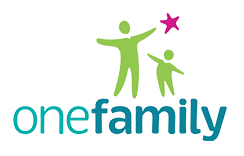

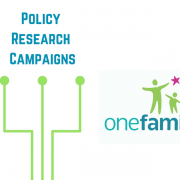

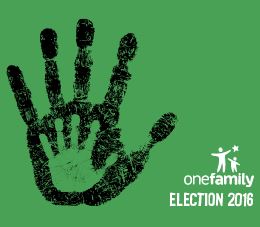
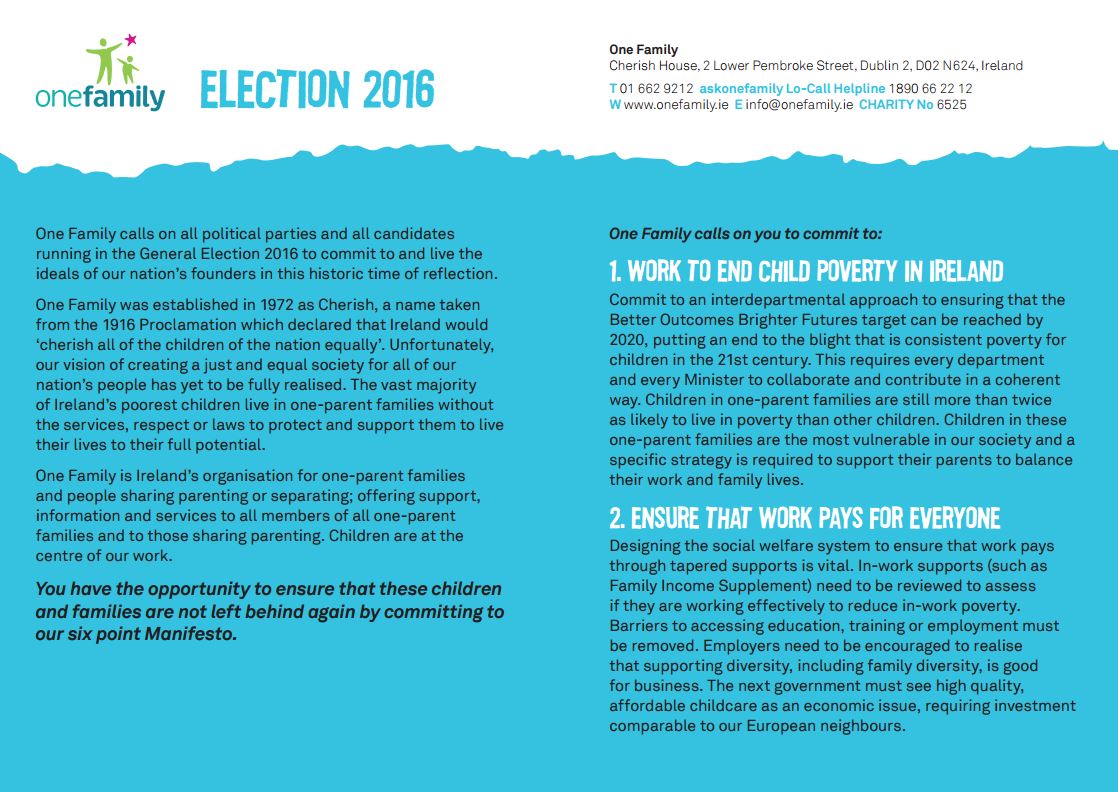
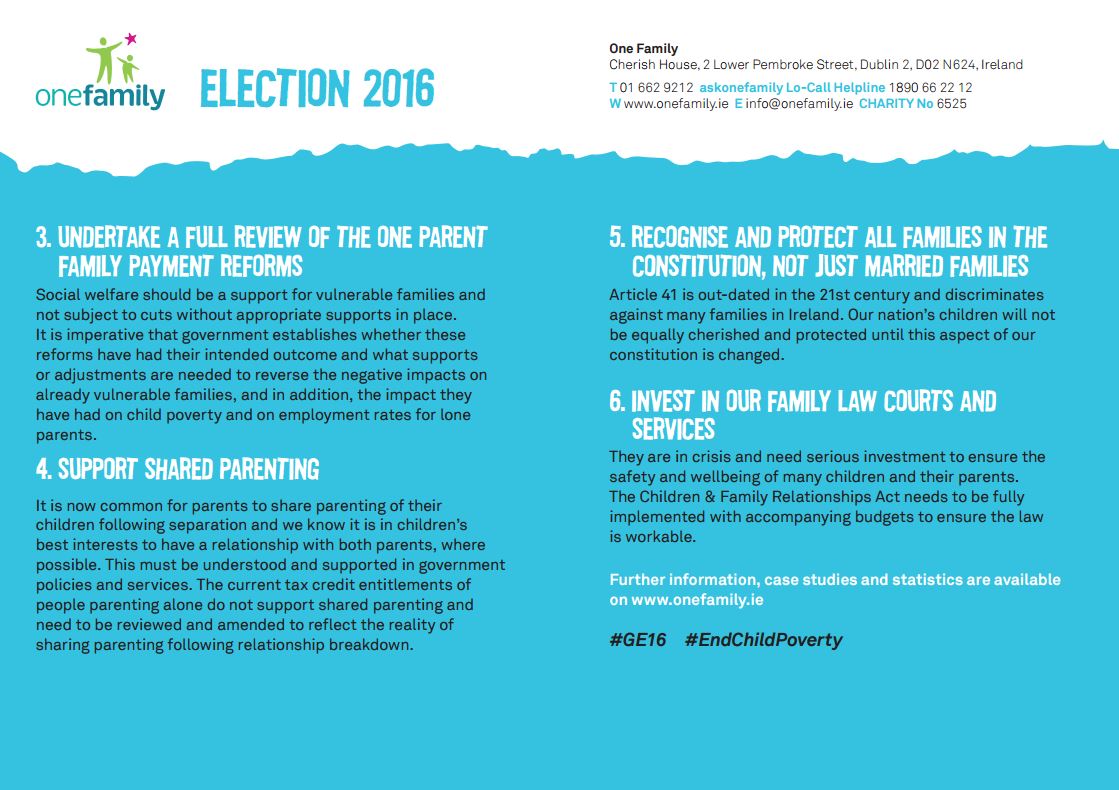

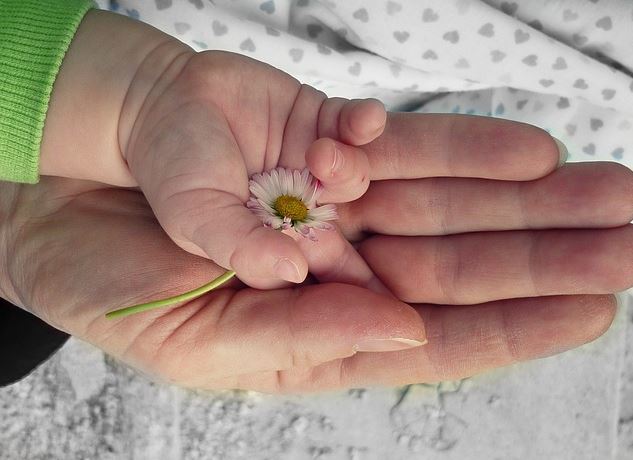
 In recent months, much has been written and said about both the problems and benefits for one-parent families on social welfare that have been put through the One-Parent Family Payment (OFP) reform process. At the heart of this are the cuts in income faced by many parents who are working part-time and in receipt of social welfare.
In recent months, much has been written and said about both the problems and benefits for one-parent families on social welfare that have been put through the One-Parent Family Payment (OFP) reform process. At the heart of this are the cuts in income faced by many parents who are working part-time and in receipt of social welfare.